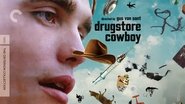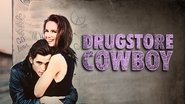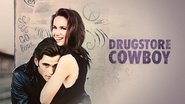avik-basu1889
I have always been of the opinion that if one wants to get a basic idea of the Flower Movement and the spirit of non-conformism that engulfed the thoughts and minds of the western youth during the 1960s and 1970s, he/she just has to watch the documentaries 'Woodstock' and "Gimme Shelter' as a double feature. 'Woodstock' shows the young people enjoying themselves with talented artists and ridding themselves of the clutches of the rigid societal norms while the spirit of peace and love hangs in the air. Then we move to 'Gimme Shelter', it just feels like the evil twin sibling of 'Woodstock'. 'Gimme Shelter' just showcases the same ideals of freedom and non-conformism being abused and misinterpreted leading to absolute hooliganism and extremely regrettable consequences.The characters in 'Drugstore Cowboy' could have attended either of the two music festivals covered in the two aforementioned documentaries respectively, but there certainly exists a stronger thematic link between the characters in 'Drugstore Cowboy' and 'Gimme Shelter'. Bob and his gang are basically wanderers with no permanent address. In a world devastated by social upheavals and political chaos, these characters are lost and have no self identity. But they are still influenced by the youth rebellion and revolts and hence they don't want to conform, they'll do anything that they want without having to be answerable to anyone. Unfortunately all that they want to do is rob drugstores and get high.The film focuses on a small group of youngsters with Bob being their leader. There's his wife Dianne and the slightly younger couple Rick and Nadine. They wander from drugstore to drugstore and come up with new and inventive ways to steal the drugs. They really have no other motive in life and are not ambitious at all. They hate the customs of 'normal' life and want to distance themselves as far as possible from societal rules. Bob and Diane evens mention some superstitions which are nothing but symbols of their insecurity and fear of society catching up with them. Bob's character in this film is somewhat similar to Michael Fassbender's character Brandon in 'Shame'. They are deeply addicted to drugs and sex respectively. Bob is always thinking and fantasising about the next score and the next high, while Brandon is always thinking about the next orgasm. Having said all that, it is a tribute to Gus Van Sant's skills as a storyteller that the characters are still humanised and well developed. The screenplay co-written by Gus Van Sant, William S. Burroughs and Daniel Yost which is based on a then unpublished novel by James Fogle avoids exploiting the characters and the circumstances to generate comedy which I thought some scenes in 'Trainspotting' were guilty of. 'Drugstore Cowboy' is more in the same vein as something like 'Requiem for a Dream' where the director doesn't shy away from depicting the pathetic nature of the lives of the characters and makes them do some very objectionable things, but in the end still manages to make the viewer care about them. The only major problem that I had with the film was the somewhat overly quick change that takes place in Bob's character at the midway point of the film. The explanation for the shift was given, but I would have liked Bob to go through such a transition in a more gentle and gradual manner.Roger Ebert in his review correctly noted that 'Drugstore Cowboy' shares a thematic and stylistic resemblance with some of the other great outlaw road movies like 'Midnight Cowboy' and 'Bonnie and Clyde'. To some extent some scenes even reminded me of Scorsese's Mean Streets. Acting wise, Matt Dillon is the shining star. Others put in good performances too, but it is Dillon who carries the film on his shoulders. His masculine charm and appeal reminded me of Stallone in the first Rocky. But even with the charm, Dillon still manages to exude vulnerability and depth to a character who is struggling to find his place in the world.The ending to the film is rich with irony. It clearly establishes how life can be so unpredictable, mysterious and harsh. The characters in the film clearly took up drugs and their lifestyle to escape the unpredictability and the harshness of real life, but they forgot that life's realities always have a way of catching up with you no matter how hard you try to escape them.
Terrell Howell (KnightsofNi11)
Gus Van Sant's films all seem to be set at a different level of indie quality. That indie level usually seems to depend on the number of big name stars appear in the film. His films like Elephant or Paranoid Park star non-actors in leading roles, and they're some of the most experimental of his films. But the experimentation goes away slightly when stars like Matt Dillon or Kelly Lynch are introduced like in Van Sant's 1989 film Drugstore Cowboy. Drugstore Cowboy is about a group of junkies who spend their time robbing pharmacies so they can use the myriad of drugs available to get all sorts of new and crazy highs. But after a while the crew has to take their show on the road, and things quickly get complicated in this bleak real world drama that may or may not accurately capture the essence of drug addiction and the lengths some go to fuel said addiction.I said the experimental reaches Gus Van Sant goes to are quelled slightly for this film, and they are, but there is still some interesting and trippy things going on. Van Sant employs a surreal quality to his whole film, capturing the character's highs as dream like mind trips with all sorts of hidden meanings that don't make a ton of sense. But then again, they don't entirely need to. The whole film has a somber and dream like quality to it that drives the whole story and is fuel for the characters motivations, what little motivation these characters have. It's a very strange and loose story about some very strange and loose people.The problem with swathing this film with such a bleak and dreamy tone is that it makes Drugstore Cowboy kind of dull. It starts out with a lot of promise and plenty of potential. The film opens by interesting Matt Dillon's character, Bob, as he narrates an introduction to what he does and who he does it with. We then see one of their robberies take place in a tense and quiet moment. From there the plot starts to sink in as the characters lives grow more and more harrowing and the situations they find themselves in become increasingly grave. But at a certain point the film sort of plateaus and stops being interesting and you stop caring so much about the characters. I was never painfully bored with this film and I watched with a keen and interested eye all the way through, but I was by no means enthralled and the story didn't grip me like it should have.Drugstore Cowboy is a very interesting film and it does plenty of things right. Unfortunately it's just a little boring, and the events that play out aren't terribly original, and I felt like I was just watching another reformed junkie film with a little bit of a Gus Van Sant twist. This is still a pretty decent film, but don't expect too terribly much from it.
Scott LeBrun
Very interesting low key story, based on the writing of James Fogle, a man who truly wrote what he knew, of a small "family" of small time criminals & drug addicts who rob drugstores to support their habits. The ringleader is Bob (Matt Dillon), who has a certain way of doing things that has just as much to do with superstition as practicality. Bob narrates in the first person, and this helps the gritty "Drugstore Cowboy" to achieve a gripping realism. There's no melodrama here, and not much in the way of embellishment from director Gus Van Sant, who made an impressive break through with this film. The approach is very matter of fact; the actions of Bob and his gang are neither demonized nor glamorized. As a result, this makes for a compelling experience, with music by Elliot Goldenthal that is effective without ever overwhelming the action. It's gritty stuff, and pretty serious although it never becomes too grim, displaying a sense of humour on occasion and offering some hope for the future. As Bob struggles to kick his habit and leave his criminal ways behind, one can't help but root for him. Dillon does praiseworthy work in the lead, with strong support from James Le Gros, Heather Graham, and especially Kelly Lynch as the wife who has no interest in changing her lifestyle. James Remar is good as the tough, determined, but not unreasonable detective who has hounded Bob much of the time; the real treat is in seeing the legendary author and character William S. Burroughs, very well cast as "Tom the Priest". The North Atlantic seaboard atmosphere is potent, and Van Sant and Dillon just pull us right into the life and philosophy of this man who can see the writing on the wall when those hexes (mention of dogs, the presence of a hat on a bed) that he tries to avoid so much inevitably manifest themselves. Overall, "Drugstore Cowboy" is vivid, convincing, and never maudlin, with everybody involved easily giving 100% percent. Nine out of 10.
Michael Neumann
Watching a quartet of teenage junkies rob pharmacies and get high may not be everyone's idea of a good time. But director Gus Van Sant looks beyond the desperate urge for another fix and finds a good deal of insight into the addict's pursuit of slow death in the fast lane, with Matt Dillon giving a memorable performance as the leader of the sometimes comically pathetic outlaw gang. Van Sant's unflinching depiction of the junkie lifestyle is entirely sympathetic but totally unsentimental, showing the non-conformist need for a high without ever glamorizing the drug culture. The episodic story is set (and with good reason) in the year 1971, after the mysticism of experimentation had long since become the grim reality of addiction, but it loses some momentum after Dillon enters a rehabilitation clinic, at which point the film attempts to express verbally what it already proved it could show visually. But the script never sells out for any tidy moral lesson, and the presence of Beat Generation icon William Burroughs in a small but notable cameo role lends a measure of credibility to Van Sant's intentions.














